高中英语必修四第三单元导学案
- 格式:doc
- 大小:47.00 KB
- 文档页数:4
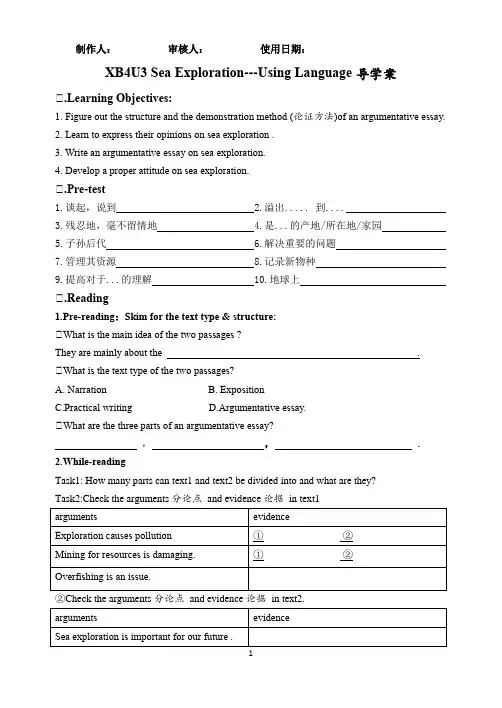
XB4U3 Sea Exploration---Using Language导学案Ⅰ.Learning Objectives:1. Figure out the structure and the demonstration method (论证方法)of an argumentative essay.2. Learn to express their opinions on sea exploration .3. Write an argumentative essay on sea exploration.4. Develop a proper attitude on sea exploration.Ⅰ.Pre-test1.谈起,说到2.溢出..... 到....3.残忍地,毫不留情地4.是...的产地/所在地/家园5.子孙后代6.解决重要的问题7.管理其资源 8.记录新物种9.提高对于...的理解 10.地球上Ⅰ.Reading1.Pre-reading:Skim for the text type & structure:①What is the main idea of the two passages ?They are mainly about the .①What is the text type of the two passages?A. NarrationB. ExpositionC.Practical writingD.Argumentative essay.①What are the three parts of an argumentative essay?,,.2.While-readingTask1: How many parts can text1 and text2 be divided into and what are they?Task2:Check the arguments分论点and evidence论据in text1arguments evidenceExploration causes pollution①_______________ ②_______________Mining for resources is damaging.①_______________ ②_______________ Overfishing is an issue.___________________________________②Check the arguments分论点and evidence论据in text2.arguments evidenceSea exploration is important for our future .___________________________________Understanding more about the sea will also help us manage its resources better.①_______________________________② Sea exploration is important for our future Vast amounts of ___________________Task3:Answer the questions in activity 3(in p33③)3.Post -reading :S hould the sea be explored? Why or why not? And reasons.Ⅰ.Writing :Guided writing task --express your opinions假如你是李华,最近你们班就“人类是否应该进行海洋探索”进行了讨论,请根据讨论结果写一篇短文。
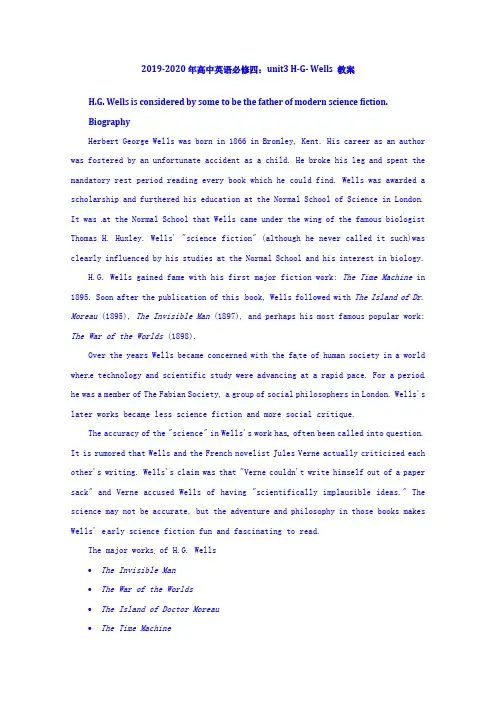
2019-2020年高中英语必修四:unit3 H-G- Wells 教案H.G. Wells is considered by some to be the father of modern science fiction.BiographyHerbert George Wells was born in 1866 in Bromley, Kent. His career as an author was fostered by an unfortunate accident as a child. He broke his leg and spent the mandatory rest period reading every book which he could find. Wells was awarded a scholarship and furthered his education at the Normal School of Science in London. It was at the Normal School that Wells came under the wing of the famous biologist Thomas H. Huxley. Wells' "science fiction" (although he never called it such)was clearly influenced by his studies at the Normal School and his interest in biology.H.G. Wells gained fame with his first major fiction work: The Time Machine in 1895. Soon after the publication of this book, Wells followed with The Island of Dr. Moreau (1895), The Invisible Man (1897), and perhaps his most famous popular work: The War of the Worlds (1898).Over the years Wells became concerned with the fa te of human society in a world wher e technology and scientific study were advancing at a rapid pace. For a period he was a member of The Fabian Society, a group of social philosophers in London. Wells's later works became less science fiction and more social critique.The accuracy of the "science" in Wells's work has often been called into question. It is rumored that Wells and the French novelist Jules Verne actually criticized each other's writing. Wells's claim was that "Verne couldn't write himself out of a paper sack" and Verne accused Wells of having "scientifically implausible ideas." The science may not be accurate, but the adventure and philosophy in those books makes Wells' e arly science fiction fun and fascinating to read.The major works of H.G. Wells∙The Invisible Man∙The War of the Worlds∙The Island of Doctor Moreau∙The Time MachineThe First Men in the Moon。
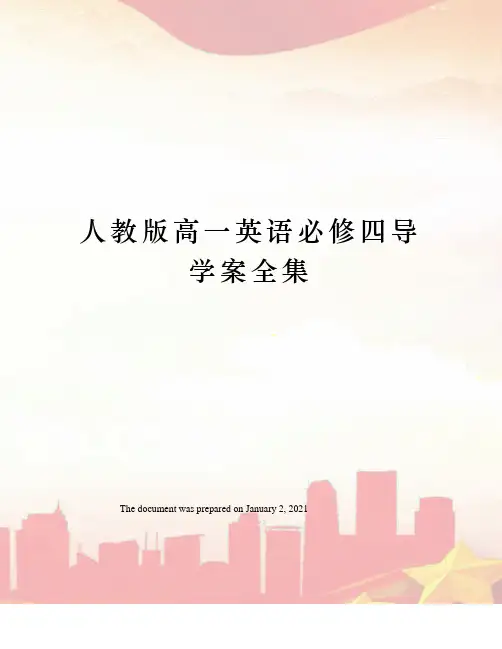
人教版高一英语必修四导学案全集The document was prepared on January 2, 2021必修四Unit 1 Great women and their achievements 一、语言要点IV 重点词汇(旨在提供综合运用所需材料)1. behave vt.&vi. 举动;(举止或行为)表现 behavio(u)r n. 行为;举止;习惯[典例]1). Behave yourself; don’ t make a fool of yourself. 注意你的举止, 别闹出笑话来。
2). How is your new car behaving 你的新车性能如何[重点用法]behave oneself 使某人自己举止规矩behaviour towards/to... 对……的态度/行为[练习] 根据句子的要求在括号里填入适当的词或翻译。
1). It’ s hard to train children to _______ _______ (举止得体) at the table.2). She is always _______ _______ (举止得体) at school.3). Their _______ (behave) _______ (介词) me shows that they do not like me.Keys: 1). behave well 2). well behaved 3). behaviour towards2. achievement n.[c]成就,功绩 achieve vt. 取得,完成[典例]1). He received the Nobel Prize for his scientific achievements. 他因科学上取得的成就而获得诺贝尔奖。
2). Flying across the Atlantic for the first time was a greatachievement. 首次飞越大西洋是一个伟大的功绩。
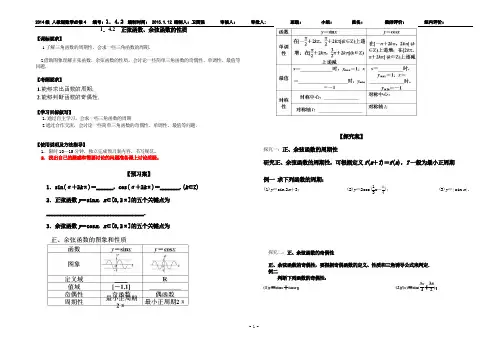
1.4.2正弦函数、余弦函数的性质【课标要求】1.了解三角函数的周期性,会求一些三角函数的周期.2.借助图象理解正弦函数、余弦函数的性质,会讨论一些简单三角函数的奇偶性、单调性、最值等问题.【考纲要求】【学习目标叙写】1.通过自主学习,会求一些三角函数的周期2.通过合作交流,会讨论一些简单三角函数的奇偶性、单调性、最值等问题.【使用说明及方法指导】1.限时10—15分钟,独立完成预习案内容,书写规范。
2.找出自己的疑惑和需要讨论的问题准备课上讨论质疑。
【预习案】1.sin(α+2kπ)=______,cos(α+2kπ)=_______.(k∈Z)2.正弦函数y=sin x,x∈[0,2π]的五个关键点为___________________________________.3.余弦函数y=cos x,x∈[0,2π]的五个关键点为【探究案】探究一:正、余弦函数的周期性研究正、余弦函数的周期性,可根据定义f(x+T)=f(x),T一般为最小正周期例一求下列函数的周期:(1)y=sin 2x+3; (2)y=2cos(13x-π4); (3)y=|sin x|.探究二:正、余弦函数的奇偶性正、余弦函数的奇偶性,要根据奇偶函数的定义、性质和三角诱导公式来判定.例二判断下列函数的奇偶性:(1)y=sin x+tan x;(2)f(x)=sin(3x4+3π2);(3)f (x )=1+sin x -cos 2x1+sin x; (4)f (x )=1-cos x +cos x -1.【拓展1】 若本例(4)改为f (x )=1-cos x ,其奇偶性如何?探究三:正、余弦函数的单调性要结合正、余弦函数的图象和周期性,求解单调区间.例三 求函数y =2sin(π4-x )的单调区间.【拓展1】 求函数y =2sin(x +π4)的单调区间.探究四:正、余弦函数的定义域、值域及最值此类问题主要利用它们的有界性:|sin x |≤1,|cos x |≤1(x ∈R).例四 (1)求函数y =2sin(x +π3),x ∈[π6,π2]的值域;(2)求函数y =11+sin x的定义域、值域和最值.【拓展1】 求函数y =cos2x +2sin x -2,x ∈R 的值域.【二次备课】。
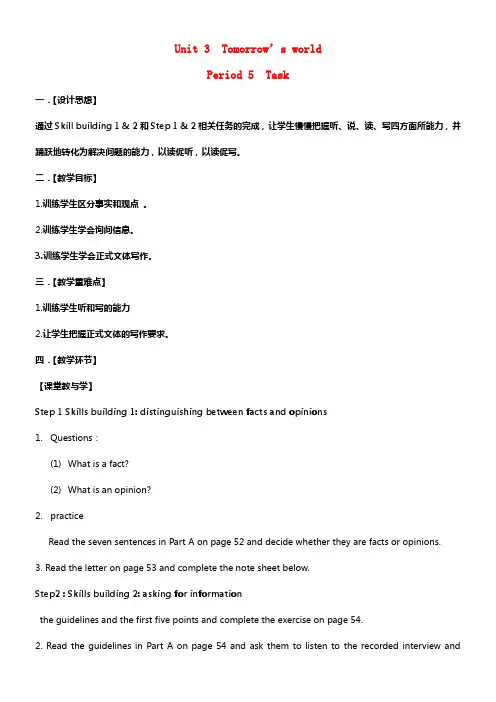
Unit 3 Tomorrow’s worldPeriod 5 Task一.【设计思想】通过Skill building 1 & 2和Step 1 & 2相关任务的完成,让学生慢慢把握听、说、读、写四方面所能力,并踊跃地转化为解决问题的能力,以读促听,以读促写。
二.【教学目标】1.训练学生区分事实和观点。
2.训练学生学会询问信息。
3.训练学生学会正式文体写作。
三.【教学重难点】1.训练学生听和写的能力2.让学生把握正式文体的写作要求。
四.【教学环节】【课堂教与学】Step 1 Skills building 1: distinguishing between facts and opinions1.Questions:(1)What is a fact?(2)What is an opinion?2.practiceRead the seven sentences in Part A on page 52 and decide whether they are facts or opinions.3. Read the letter on page 53 and complete the note sheet below.Step2 : Skills building 2: asking for informationthe guidelines and the first five points and complete the exercise on page 54.2. Read the guidelines in Part A on page 54 and ask them to listen to the recorded interview andcomplete the interview form.Step3: Skill building 3:formal writing1.Ask students to read the guidelines in Part A on page 56.2.Ask students to complete the summary of the survey according to the given information onpage57.3.Give students some time to write the proposal. Ask several students to read their works in class.【课堂巩固】Show your proposal to the whole class.【知识小结】1.听力进程中关于所提到的相关信息要进行记录。
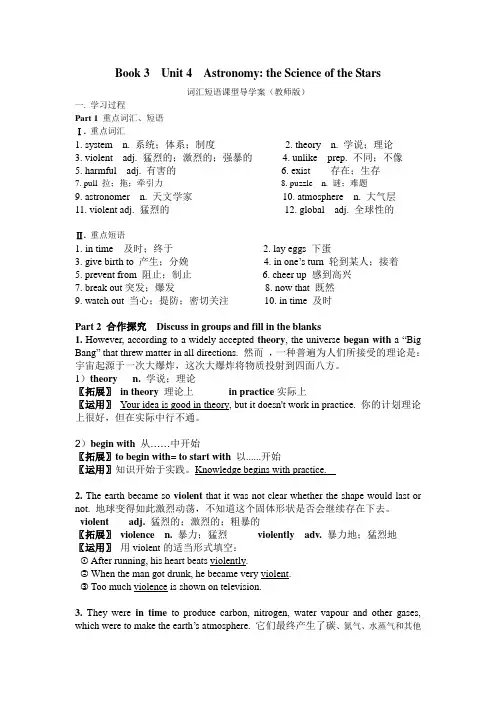
Book 3 Unit 4 Astronomy: the Science of the Stars词汇短语课型导学案(教师版)一. 学习过程Part 1重点词汇、短语Ⅰ. 重点词汇1. system n. 系统;体系;制度2. theory n. 学说;理论3. violent adj. 猛烈的;激烈的;强暴的4. unlike prep. 不同;不像5. harmful adj. 有害的6. exist 存在;生存7. pull 拉;拖;牵引力8. puzzle n. 谜;难题9. astronomer n. 天文学家10. atmosphere n. 大气层11. violent adj. 猛烈的12. global adj. 全球性的Ⅱ. 重点短语1.in time 及时;终于2. lay eggs 下蛋3. give birth to 产生;分娩4. in one’s turn 轮到某人;接着5. prevent from 阻止;制止6. cheer up 感到高兴7. break out突发;爆发8. now that 既然9. watch out 当心;提防;密切关注10. in time 及时Part 2 合作探究Discuss in groups and fill in the blanks1. However, according to a widely accepted theory, the universe began with a “Big Bang” that threw matter in all directions. 然而,一种普遍为人们所接受的理论是:宇宙起源于一次大爆炸,这次大爆炸将物质投射到四面八方。
1)theory n. 学说;理论〖拓展〗in theory 理论上in practice实际上〖运用〗Your idea is good in theory, but it doesn't work in practice. 你的计划理论上很好,但在实际中行不通。
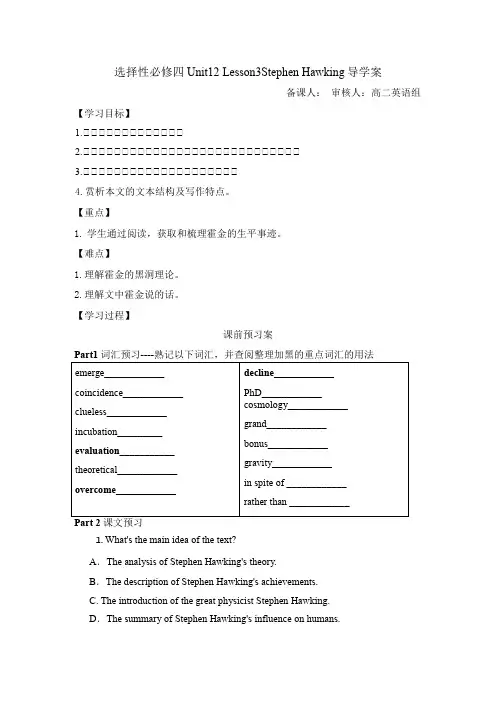
选择性必修四Unit12 Lesson3Stephen Hawking导学案备课人:审核人:高二英语组【学习目标】1.获获获获获获获获获获获获获2.获获获获获获获获获获获获获获获获获获获获获获获获获获获获3.获获获获获获获获获获获获获获获获获获获获4.赏析本文的文本结构及写作特点。
【重点】1. 学生通过阅读,获取和梳理霍金的生平事迹。
【难点】1.理解霍金的黑洞理论。
2.理解文中霍金说的话。
【学习过程】课前预习案1. What's the main idea of the text?A.The analysis of Stephen Hawking's theory.B.The description of Stephen Hawking's achievements.C. The introduction of the great physicist Stephen Hawking.D.The summary of Stephen Hawking's influence on humans.Read the text on Pages 58-59 and choose the best answer to each question.1.Which of the following is TRUE about the book A Brief History of Time: From the Big Bang to Black Holes?A.It was written by Albert Einstein.B.It tells people about Hawking's life.C.It became the base for a lot of research.D.It sold well around the world.2.What can we learn from the text?A.Hawking was satisfied with his life when he first knew his disease.B.Although Hawking had a serious disease, he still had a wonderful and meaningful life.C.Hawking has millions of fans in both China and England.D.Hawking travelled around the world to attend TV shows.3.What is the writer's purpose in writing this text?A.To introduce Hawking's life to help people remember him.B. To introduce Hawking's famous theory about the universe.C. To tell us one of the brightest stars—Hawking died.D. To describe Hawking's serious physical disease.课堂探究案Activity 1:Skim the text and answer the question.1.When did he become ill? What was the result of his illness?2.What did he study? What did he find?3.What books did he write? What did he argue in the books?4.What is a black hole?Activity 2: Introduce Stephen Hawking.Stephen HawkingActivity 3: Group workThink and share.1. What was Stephen Hawking's attitude towards life? Find evidence from the webpage.2. What do you think this saying by Stephen Hawking means: “ Look up at the stars and not down at your feet…be curious.”?3. How are the paragraphs on the webpage connected to each other? Find and circle the indicators.Activity 4: Analyze the long and difficult sentences.1.Hawking was famous,not just for his brilliant work in theoretical physics and cosmology,but also for overcoming the challenges of ALS(a disease that affects muscle control).2.At the age of 21, when Hawking spent his first year at the University of Cambridge, physicians discovered he had a rare, slow-progressing form of ALS.3.In The Grand Design (2010, with Leonard Mlodinow), Hawking argued that we should look for a different way to discover the deepest secrets of the universe. Instead of trying to find one big new explanation, scientists should put together all the ideas that they already have.4.And he believed this was because of the help he received from his family and a large number of people and organisations.Activity 5:Complete the summary.Stephen Hawking was born in 1942. He studied at Universities of Oxford and Cambridge, but at the age of 21, he was diagnosed with a serious disease. However, he finished his ①___________ and got a job at the University of Cambridge and continued his work in ②___________ physics and ③___________ . While his reputation for his work spread, his physical ability ④___________ . In 1985, after an operation, he started to use ⑤___________ to help him talk. However, Hawking never ceased his studies and he continued to develop his theories on ⑥___________ . Hawking believed that he was not an unlucky person. From his diagnosis at 21 he regarded everything since then as a⑦___________ . He was proud of his family and his work, and he appreciated the help that many people had given him.Activity 7: HomeworkFind more information about Stephen Hawking online.Do you feel inspired by him? Give reasons along with your comments.。
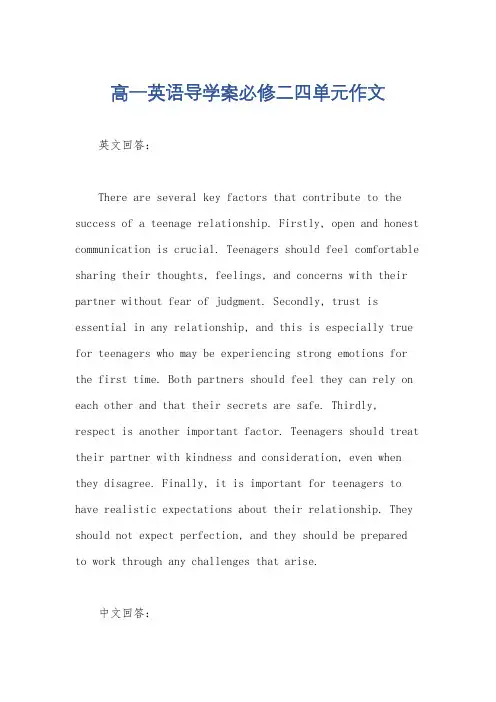
高一英语导学案必修二四单元作文英文回答:There are several key factors that contribute to the success of a teenage relationship. Firstly, open and honest communication is crucial. Teenagers should feel comfortable sharing their thoughts, feelings, and concerns with their partner without fear of judgment. Secondly, trust is essential in any relationship, and this is especially true for teenagers who may be experiencing strong emotions for the first time. Both partners should feel they can rely on each other and that their secrets are safe. Thirdly, respect is another important factor. Teenagers should treat their partner with kindness and consideration, even when they disagree. Finally, it is important for teenagers to have realistic expectations about their relationship. They should not expect perfection, and they should be prepared to work through any challenges that arise.中文回答:对于青少年来说,一段成功的恋爱关系需要具备以下几个关键因素:1. 开放而诚实的沟通,青少年应该能够舒适地在没有评判的情况下与伴侣分享他们的想法、感受和担忧。
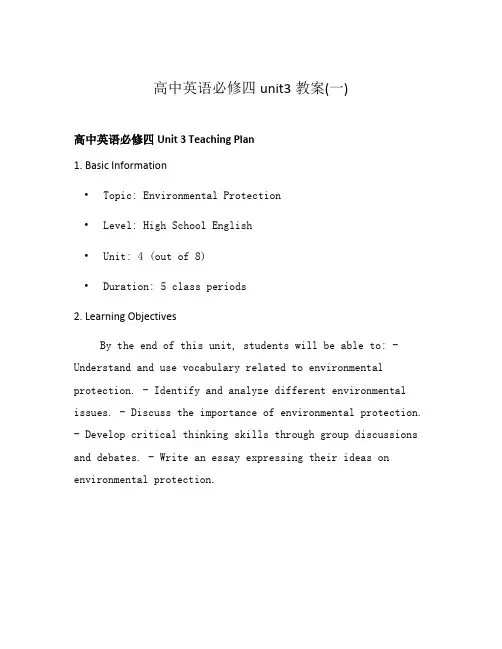
高中英语必修四unit3教案(一)高中英语必修四Unit 3 Teaching Plan1. Basic Information•Topic: Environmental Protection•Level: High School English•Unit: 4 (out of 8)•Duration: 5 class periods2. Learning ObjectivesBy the end of this unit, students will be able to: - Understand and use vocabulary related to environmental protection. - Identify and analyze different environmental issues. - Discuss the importance of environmental protection. - Develop critical thinking skills through group discussions and debates. - Write an essay expressing their ideas on environmental protection.3. Lesson PlanLesson 1: Introduction to Unit 3 (1 class period)•Start the class with a brief discussion on the importance of environmental protection.•Present key vocabulary related to the topic.•Give examples of different environmental issues. •Assign relevant reading materials for self-study. Lesson 2: Vocabulary and Reading Comprehension (1.5 class periods)•Review and reinforce vocabulary through interactive exercises:–Matching words with definitions.–Completing sentences with appropriate words.–Creating sentences using vocabulary words. •Assign relevant reading passages for students to read and summarize for the next class.Lesson 3: Reading Analysis and Class Discussion (1 class period)•Divide the class into small groups.•Ask each group to analyze and discuss the main ideas and arguments presented in the assigned readings.•Encourage students to share their opinions and ask questions during the discussion.•Lead the class in a whole-group discussion to summarize the main points.Lesson 4: Debate Preparation (1 class period)•Divide the class into two teams: “For” and “Against”environmental protection.•Allocate time for each team to research and prepare arguments for their positions.•Provide guidance on structuring and presenting arguments effectively.•Facilitate practice debates within each team.Lesson 5: Debate and Essay Writing (1.5 class periods)•Conduct the debate between the two teams.•Encourage students to express their opinionsconvincingly and respectfully.•After the debate, assign an essay writing task:–Topic: “The Role of Individuals in Environmental Protection”–Provide guidelines on structuring and supporting arguments.–Allocate time for students to brainstorm ideas and write an essay.4. Assessment•Assess students’ understanding through active participation in class discussions.•Evaluate vocabulary comprehension through interactive exercises.•Grade the debate based on argument clarity, presentation skills, and rebuttal capability.•Evaluate the essays based on structure, language use, and supporting evidence.5. Additional Resources•Relevant reading materials on environmental protection. •Online platforms or environmental organization websites for additional research.•Examining sample debate videos for reference and inspiration.•Model essays for students to analyze and learn from.•Chart paper and markers for group discussions and debate preparation.6. Differentiation•For students who have difficulty with vocabulary, provide extra practice exercises and flashcards.•For students who need more scaffolding, provide a list of key vocabulary words and definitions in advance. •For advanced students, assign additional readings or research projects related to environmental protection. •Provide opportunities for visual learners to create posters or infographics related to the topic. •Incorporate technology by using online resources for research and interactive activities.7. Homework•Assign reading passages and comprehension questions for students to complete and discuss in the next class. •Ask students to research and prepare arguments for their debate positions.•Require students to complete their essay writing assignment and submit it for review.8. Assessment Criteria•Active participation in class discussions and activities •Vocabulary comprehension through exercises and application•Quality of analysis and discussion during the group and whole-class discussions•Clarity, persuasiveness, and logical reasoning in the debate presentations•Structure, language use, and support of arguments in the essay writing9. ConclusionThis teaching plan aims to engage students in learning about environmental protection by providing variousactivities and opportunities for critical thinking and expression. It encourages students to develop their own opinions while also engaging in respectful debates and collaborative discussions. Through this unit, students will not only improve their English language skills but also develop a deeper understanding of the importance of environmental protection.。
1 高三英语 yy-12- 12-10
必修四 Unit 3 单元复习训练案
编写:竺必川 审核:高三年级组 编写时间:2012-12-10 班级: 姓名: 组别: 组名: 【学习目标】 1.We can master the usages of the important words and expressions in this unit. 2.We can analyze the structure of important sentences. 【重点难点】 1.We can analyze the structure of important sentences. 2.We can master and use the grammar flexibly: V-ing form can be used as the object complement, predicative and attribute. 【方法指导】 We can recite them on the basis of understanding them and then use them. 【学习步骤】 Step 1.重要单词 (A 级) 1. adj. 满足的;满意的n. 满足 vt. 使满足 2. adj. 幸运的;吉利的 3. vt.&vi. 战胜;克服 4. adj. 突出的;杰出的;显著的 5. n. 姿态;手势vi. 做手势 6. n. 时刻;场合 7. adj. 特殊的;特别的 n. 细节;细目 8. vt.&vi. (使)滑动;(使)滑行 n. 滑;滑动;幻灯片 9. n. 耳语;低语 vt.&vi. 低语;小声说 10. n. 脏或乱的状态 11. vi. 作出反应;回应 12. n.幽默;滑稽→ adj.滑稽的;幽默的 13. n.表演者;演出者→ v.执行;表演 n.执行;演出14. vt.&vi.使欢乐;款待→ n.娱乐 adj.愉快的;有趣的15. vt.使信服→ adj.令人信服的 adj.坚信不移的 16. vt.&vi.导演;指示;指挥 adj.直的;直接的;直率的→ n.导演→ n.指导→ adv.&conj.直接地;径直地;一„„就„„ 17. vt.使发笑;使愉快→ adj.好笑的;有趣的→ adj.愉快的→ n.消遣;娱乐(活动) Step 2 。重要短语 (B级) 1. 对„„满足 2. 穷的;缺少的 3. 挑出;辨别出 4. 切断;断绝 5. 担任主角;主演 6. 直到现在 7. 寻找某人/某物 8. 在户外;在露天 9. 款待某人 10. 使某人相信某事 11. 放声大笑 12. 对.....挑剔 13. 溜进 不知不觉染上 14. 对......做出反应 Step 3 。重要句型 2
1.【课文回放】Unfortunately his father died, leaving the family even worse off,so Charlie spent his childhood looking after his sick mother and his brother. 不幸的是他的父亲去世了,使得他的家境更加艰难,因此,卓别林童年时期都在照顾他生病的母亲和弟弟。 (A级) 【句型分析】 leaving the family even worse off为现在分词短语作结果状语。 【完成句子】 (B级) 1.He shut down the engines to slow the ship, for it to be abandoned. 他关掉发动机使轮船慢了下来,这会使弃船逃生更容易。(make) 2.A few men were quarrelling noisily at midnight, almost everyone in the building. (wake) 几个人在半夜吵架,几乎把大楼里每个人都吵醒了。 2.【课文回放】 As Victor Hugo once said, “Laughter is the sun that drives winter from the human face”, and up to now nobody has been able to do this better than Charlie Chaplin. 维克多·雨果曾经说过:“笑容如阳光,能驱走人们脸上的冬天。”关于这一点,直到今天也没有人能比查理·卓别林做得更好。 【句型分析】 as 引导的定语从句,代替后面句子的内容。自己想想 as 的其它用法。 【完成句子】 (C级) 1.正如我们所期待的那样,他们及时地来帮助我们。 ________________________, they came to help us in time. (as) 2.众所周知长江是中国最长的河流。 ,the Changjiang River is the longest river in China. (as) that the Changjiang River is the longest river in China. (it) that the Changjiang River is the longest river in China. (what) 3.【课文回放】 Instead they are hiding in a small hut on the edge of a mountain during a snowstorm with nothing to eat. (B级) 【句型分析】 with 的复合结构在句子中常作状语,表示伴随状况,原因,方式,条件等。其结构如下:with + 宾语+adj./ adv./n./介词短语/doing/done/to do. 【完成句子】 (c级) 1.He left the room .(with) 他离开了房间,灯亮着。 2. The boy often sleeps with . 这个男孩总是都枕着胳膊睡觉。 3. The Smiths left for China with their children and parents . The Smiths 让父母和孩子居住在美国,他们来到了中国。 4.【课文回放】 Then he cut off the leather top of the shoe as if it were the finest steak. 【句型分析】 1.在本句子 as if 意为“仿佛,好像”,引导的是状语从句 2.若陈述的是一件事实,从句用陈述语气;若表示一种虚拟、假设情况或不可能实现的情况,则用虚拟语气。虚拟形式为: as if + 主语+ 过去时(与现在事实相反) as if + 主语+ 过去完成时 (与过去事实相反) as if + 主语+ would/should/might/could +V. (与将来事实相反) 3
3. as if 引导方式状语从句时可用省略形式,后面接名词,形容词,副词,介词短语,分词和不定式。 【句子翻译】 (B级)Put the following into Chinese . 1. She was shaking with fright as if she had seen a ghost.
2.It seems that it is spring already.
3.
4. The player is rolling on the ground as if hurt badly in the leg.
5.The old woman looked at the boy as if he had been her son.
5.【课文回放】 By his teens, Charlie had, through his humour, become one of the most popular child actors in England. (B级) 在十多岁的时候,凭借着自己的幽默,查理已经在英国成为最受欢迎的童星之一。 解读:by表示“到„„为止”,句子常用完成时态。 【完成句子】 到本周末他们将会搬进新家。(C 级) They __________________________ the new house by the end of this week.(move) 【扩 展】 Put the following into English .(C 级) 1. 奥巴马在四十多岁时被选为美国总统。 2. 上个世纪三十年代全球爆发过一次经济危机。
Step 4 。 Grammar Look at the examples and pay attention to the V-ing form.(A级) 1.His job is looking after the babies. ( 表语 ) 2.His subtle acting made everything entertaining. ( / ) 3.Nobody can stop the running horse. ( ) 4.I know the man standing there. ( ) 5. I caught a stranger sliding into the manager's office. ( ) 【完成句子】 (C级) 1.Our favourite cartoon character is Mickey Mouse; it ______________________ that we often burst into laughter when we see it. (excite) 我们最喜欢的卡通人物是米老鼠;它太令人感到兴奋了以致于每当我们看到它就会大笑起来。 2.The next day, they came again to the park,_________ in the same place. (seat) 第二天,他们再次来到公园, 发现他坐在同一个地方。 3.There are about 53,200 Mari people,____________________ of the total population of New Zealand. (make) 大约有53200毛利人,占新西兰总人口的14%。 4.It is practically an open secret, and not something_______________ . (confirm) 实际上这是一个公开的秘密,是不需要证实的事情 5.The hotel______________________ now was designed by a group of young men last year. (build)